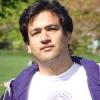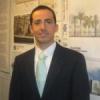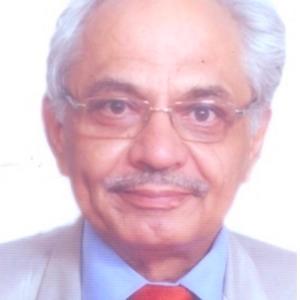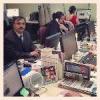
Rapid Increase in Science Education - RISE. by PlanetRISE
 Paulo Borges De Brito May 7, 2014 03:12 |
Interesting project. How would you set up the organizational structure of this project.
Education projects bring social capital as one of key factors for success so think about that.
Also, you talk about science in general terms, how would you include climate change topics
in the proposal?
Best,
Paulo
|
 Tom Morris May 8, 2014 07:00 | Proposal contributor
I will "flesh out" the structure in the proposal when I get time; medical issues limit the time I can work on project. the basic structure would be
a site similar to climatecolab where interested parties could propoae educational plans and methods, volunteer to participate as watchdogs, mentors, etc. A commitee would prioritize support of proposed projects and as possible provide support.
As to your second question climite education would be intertwined with the basic foundational material; I envision a program that imparts lasting understanding of real principles rather that indoctrinating people to parrot ideas they really don't understand based on emotional appeals.
the hope is that as the RISE clearing house matured people with great ideas will bring them to the table. The concept is to proceed at a different pace depending on local conditions. i would assume that local "nodes" could develope in specific areas to better represent the unique ploblems in said area. One key principle is all submitted idea must be based on sound science.
I tend to think in broad strokes and it takes me a little while to eke out the details; roughly two months left so i'll try to get as much in before the deadline as possible. feedback is most appreciated.
|
 Sardar Mohazzam May 9, 2014 09:20 |
@ tominga - Very well done! However, I am really curious to know as you mentioned " the things that will work in California may not work in Afghanistan". How this education can change the behavior of people in the developed world. Who already know the science, except the existence of climate but still not willing to change their life-style.
It is the underdeveloped world is actually facing the brunt of climate change through deterioration of their livelihood. Developed world on the other hand, reaping the benefits development and polluting at much higher rate.
Overall, you are structuring a wonderful proposal. My questions, are meant to improve your some of the greys areas which you might have not thought about. Best of luck!
|
 Tom Morris May 13, 2014 10:19 | Proposal contributor
@mohazzam. my comment about what works in california may not work in Afghanistan was an observation that resorce availabilty and local custum and culture will dictate how RISE programs would develop. As far as those in the developed world understanding the science I think you overestimate the level of real understanding of science in the developed world. For instance I am the product of the U.S. public school system, attende about three years of college where I obtained an associates in electronics and am currently pursuing a bachelors in education as time permits. I will freely admit that my level of real understanding of many basic scientific principles would be found laking were you to quiz me.
The lack of real understanding of science among the public in developed countries allows special interest and politicians to propose and adopt "solutions" to climate problems that have not been properly vetted and may in the long term do more harm than good. As examples I would address the Fearmongering about both nuclear power and GMO crops. Both the aforementioned technologies have enourmous potential to be part of the solutions we need to provide clean power and sustainable production of food crops with less land use. while their are legitimate concerns that need to be addressed with both Nuclear power and GMO crops lobbiest and politicians use unscientific propaganda to try and convince the public that they need to be "protected" from two of the most promising solutions to the problems we have at hand. We still burn witches in the developed world; we just pick a technology that frightens people and demonize it. real scientist and educators must combat the flood of scientific nonsense that is promoted and get the public to think critically and understand what is really being proposed when solutions are presented.
I am passionate about this because I think we have the tools available now to build a better world for all humanity but are held back by ignorance or willfull manipulation by those that see personal gain in not solving problems. An educated populace can more effectively hold their leaders accountable for real solutions.
|
 Tom Morris May 13, 2014 10:34 | Proposal contributor
and my typing/spelling fail me once again :).
|
 Doron Bracha May 14, 2014 03:23 |
A real cultural change is needed in order to slow down climate change, to minimize the damage we've been causing to the environment, and to leave a sustainable world for the next generations.
Educating and raising awareness are essential, and should be done from kindergarten to college.
There are already some programs and resources out there:
http://www.p21.org/about-us/p21-framework/830-environmental-literacy
http://enviroliteracy.org/
http://celfeducation.org/
Science education is important, and may help promote change if environmental aspects are emphasized.
Cheers !..
|
 Lindsay Leveen May 14, 2014 03:39 |
Tominga you are correct in stating that our problem is social. The BRady Bunch Lifestyle is not realistic in a world with 7 billion people. What is needed is education. What is needed is a population that cares. Thermodynamics is probably the toughest course to ever comprehend. But it has to be be explained to kids and lay people. I tried that by writing a book in 2003. Writing a book is the toughest thing I ever did and it is like a sink hole of time. I believe you have a good proposal
|
 Tom Morris May 15, 2014 12:55 | Proposal contributor
@lleveen thanks for the input. I know I have a lot more work to do on the details but I hope I have something that can grow with the input of others. too often egos, politics and cultural differences have prevented real progress. I beleive the internet provides a sort of "global conscience" wher the sensibility of proposed actions can be scrutenized by a much wider audience and therby improved upon.
|
 Tom Morris May 15, 2014 06:00 | Proposal contributor
@doron-bracha. the links you posted have a wealth of information. I would like to see the many organizations that are trying to address the problem of scientific literacy under the same roof to work together.
|
 Manohar Lal Baharani Jun 19, 2014 05:44 |
Your comments "we have the tools available now to build a better world for all humanity....An educated populace can more effectively..." The world appears more informed today than more educated....the contents of education on climate change mitigation efforts at individual level / local levels will play a great role. Looking forward to furtherance of this proposal. Bests,
|
 Angélica Lara P.r. Jun 19, 2014 12:55 |
Hi,
Thank you for your submission. For me it´s a good idea, actually we are planning to develop a platform to share information about climate change, specially on REDD+ and adaptation.
One of the components of our platform will be the forums, where we try to empowering people from vulnerable communities; because of course we need instruments like your proposal but another reality is that the people need help to understand datas, so the forums is an opportunity to interchange experiences.
Regards and good luck!
|
 Vishal Bhavsar Jun 20, 2014 12:42 |
One suggestion would be to kick start this programs through roping in governments. For example in India that is large proportion of schools that is run by state(provincial) government. If this RISE program can be pushed through government's agenda it will have a real impetus. This would also have mechanism to track the roll out of RISE program and assess the impact of the project. Based on the success and learning of the program in government program similar project can be introduced through private schools.
You could also think of doing pilot and use technology to have disruptive impact of the whole program.
Keep up the good work. All the best!
|
 Sergio Pena Jul 15, 2014 12:26 |
Would you consider to expand the project to students at the primary schools? More students do have a lack of knowledge about science in a broacd concept. Therefore, a first approach or exposure to science should be at the primary level.
Would you consider Law and other Social Sciences in your proposal? I read your proposal and it seems to me that you are working on Natural Science. Social Sciences might be considered in your work.
What kind of new books and pedagogical materials should be prepare in order to bring science to students of primary schools?
Best
|
 Climate Colab Aug 5, 2014 08:47 |
Judge 1: The proposal outlines a plan to rapidly increase science education to increase urgency on climate change solutions and reduce misinformation or what the proposal calls "bad" science.The idea of increasing science literacy is appealing on its surface, but I'm not convinced that there is evidence that this strategy will work, and there is research suggesting that people who are more scientifically literate on climate change issues tend to be the most polarized people on both sides.
Judge 2: There is no question that scientific literacy is a tremendous problem that we face today, on issues like climate change as well as GMOs, nuclear power, vaccines and autism, etc. The National Science Foundation estimates that 2/3 of Americans do not understand science or the scientific process. This makes them highly susceptible to pseudo-science and manipulation. But there are many people and organizations trying to overcome this ignorance. How is your proposal different in achieving similar aims?
|